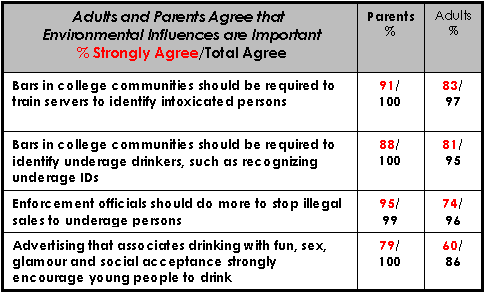|
New American Medical Association Poll Finds College Binge Drinking a Top C |
| Results of National Poll Show |
| Overwhelming Support for Georgia Tech Alcohol Policies |
|
| August 29, 2001 (Atlanta) - - Fall classes have started this year and the dean of Student's office staff has prepared all summer students returning to the Georgia Tech campus. Sam Becknel, project director of the GT SMART Coalition at Georgia Tech, a project to reduce high-risk drinking, knows that hel'll be hearing the concerns voiced by parents and others about how easy it is for underage college kids to get alcohol and about the widespread availability of alcohol around college campuses. |
| It's a fact that today, parents of college students have more to worry about than just the cost of their child's education, according to a poll just released by the American Medical Association1. Their concerns about excessive alcohol consumption by their children and the easy availability of alcohol in college communities were among the survey findings released today by the Matter of Degree program of the AMA. |
| The program, supported by the Robert Wood Johnson Foundation, aims to reduce binge drinking and its harmful effects on college communities. Georgia Tech University, along with nine other leading universities, participates in the program. |
| Rather than approaching binge drinking as solely an individual problem, the Matter of Degree program emphasizes partnerships between the campus and community to counter the factors that contribute to binge drinking. These factors include illegal sales to underage students and too many bars near campus. |
| As a part of this effort, Georgia Tech, through the GT SMART Project, supported a statewide effort to create a new keg registration law that will decrease availability of alcohol to underage college kids. |
| And, the AMA study found, parents strongly favor such policies to curb high-risk drinking. |
| “The results of this survey validate that the policies we have implemented on our campus are the right approach to take in addressing high-risk drinking among our students,” said Gail DiSabatino, Dean of Students at Georgia Tech. “Parents no longer see college binge drinking as a rite of passage, but as a major public health problem,” DiSabatino added. “They want policies that will make their children's college experience healthier and safer.” |
| According to the poll, 95% of parents surveyed believe that excessive alcohol consumption is a serious health and safety threat to their children and 85% say that the easy availability of alcohol in college communities contributes to too much drinking. |
 |
| Controlling the number of alcohol outlets and eliminating illegal service to underage people are two important measures for reducing easy availability, said Tim State, President of Home Park Improvement Association. State is one of the people working with the GT Smart group to reduce the number of bars near campus. |
| “It's widely known that the greater the number of alcohol outlets there are in a given area, the more that area suffers from alcohol-related problems,” Tim State stated. “Assaults, car crashes, and violent crime all increase when the supply of liquor increases,” Tim State added. |
| “Training bar staff on how to properly check ID's and generally be more responsible can make a world of difference, “ Becknel said. “They have to recognize that they're not serving candy here.” Many of the alcohol-related problems, Becknel says, are related to underage purchase of alcohol easy availability to alcohol. |
| The Matter of Degree program also released a “Top 10” checklist of campus and community warning signs to help parents assess their child's risk for alcohol-related problems. Questions about the college's alcohol policies and local requirements for training bar owners and employees to serve alcohol responsibly are included in the list. |
| “While we can't abandon efforts to help the individual drinker, we have to go beyond these traditional prevention efforts and recognize that the social environment in which people live, work and learn also influences decision-making,” said Dean DiSabatino. “We firmly believe that the collaboration we're fostering between Georgia Tech, city officials, students, and citizens will create lasting changes in our alcohol environment, and improve the quality of life for our whole community.” |
|
| 1 The study of 801 U.S. residents, 21 years of age and older, was conducted by Penn, Schoen and Berland of Washington, DC. Margin of error is +/- 3.5% at the 95th percentile confidence interval level. |
|
|